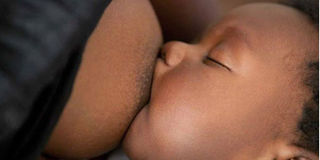Winning together in breastfeeding

A mother breastfeeding her child.
What you need to know:
- For the 2024 World Breastfeeding Week theme, I think we all understood the assignment!
Last week we celebrated the world breastfeeding week; a global campaign held every first week of August to raise awareness and galvanise action in support of raising healthy babies.
The week has been observed since 1992, with various themes every year that seek to promote breastfeeding, touching on how to better support women to breastfeed. These themes have looked at various aspects, including women in the workplace, health systems strengthening, community engagement, male partner involvement and management of breastmilk substitutes.
This year’s theme is “Closing The Gap; Breastfeeding Support for All!”
The event was marked across the country through various activities espousing the theme. I had the distinct pleasure of attending two events in two extremely diverse communities, and boy, did I not learn a whole lot more!
West Pokot County launched the World Breastfeeding Week on Monday, August 5. The county department for Health thought it wise to hold the launch in the community. The community chosen to host the event was well thought out because it is currently the one with the poorest indicators in the county with regards to breastfeeding and child nutrition. This is the area with the highest stunting rates for children under five years of age.
We had to cross six seasonal streams spanning a distance of about five kilometres to get to Tachit Village in Chepareria Ward, Pokot South Constituency in Kipkomo Sub-county. We were literally wading through the sandy riverbeds as none of these streams have a bridge. Thankfully on that morning, the streams just had small trickles of water. Not knowing how tricky the road was, we had shown up in a vehicle not made for such passage. We could only hope that it did not rain before we made it back to the tarmac road.
The welcome was unexpected! The community came all out. The beautiful Pokot girls were decked out in brightly coloured pleated skirts and beads adorning their necks. They sang and danced as they welcomed the guests and taught us how to jump in unison as part of the dance. The men sat together to one side, under the trees, watching quietly as the celebrations went on. There were plenty of women present, either pregnant or breastfeeding the young ones tied to their backs or secured on their side.
Being a highly patriarchal society, this was expected. In fact, it was amazing to have the men present in an event that may be largely perceived as a women affair. But they turned up and paid attention throughout the ceremony.
The event was wholly focused on educating the community about the advantages of breastfeeding, the support required for mums and babies to be able to do so successfully, and how the whole community could get involved in investing in a healthy future population. This was well executed through songs by the community women’s groups and through skits by the community health promoters (CHPs).
What stood out for me through all this was the subtle ground-breaking shift that I doubt many even noticed. The most listened-to persons in the event were the CHPs. These were a team of very young people, both men and women, most in their early 20s. They are held in very high regard as the community knows them in person and hence can easily trust them.
When it comes to health information, the patriarchal barriers instantly seem to melt away. The old men sit and listen to the young girls, forgetting their age and gender. They will take their CHP’s worlds as the gospel truth. They respect them at such a base level that hasn’t been witnessed before.
Most health workers have probably struggled to get the message across because most of them have been viewed as out of reach, and also many were foreign to the area. They have pretty much been seen as outsiders who will only be allowed to help when there was no other choice.
But to see their own sons and daughters in the sky-blue aprons, with their fancy tech gadgets, checking on their health and doling out words of advice regarding how to prevent disease, has done something in this community! For men to accept to be educated on how to support their breastfeeding wives by young ladies is testimony that there is a golden opportunity to show the community why the girl child is set to go places.
In West Pokot, the adolescent pregnancy rate is the second-highest in the country as per the Kenya Demographic and Health Survey 2022. What is of note is that this rate is majorly driven by early marriage. This hampers a lot of young girls from accessing a full education as they settle into early motherhood, grossly impacting on their economic potential and denies them an opportunity at a better life.
With the CHPs impacting the community as they currently are, the community can relate with why their daughters will require an education in order to ascend to the next level. These CHPs are the lifeline that is much needed for social change. They are slowly but surely bringing on board male involvement in healthcare, but with an impact far beyond health. One step at a time, child marriage may become a thing of the past.
Tachit village has an amazing advocate for maternal and child health, their area chief. This man graced the occasion and when he took to the podium, he had only one ask for his people; a proper four-wheel ambulance to get women in labour to Chepareria Sub-county Hospital for safe delivery.
I will up that ask; the county should construct at least a level three hospital in Tachit village. Because, when the rain pours, no ambulance can wade through the torrents to get the mother to the hospital. Nature is a fairly feisty girl who likes to have her way. It is either that, or six major bridges and a tarmac road. The county can take its pick.
And in Migori, while physical access may not be a problem to the county, the scourge of adolescent pregnancies does make a significant dent in the outcomes of newborns and infants. The young mums here are faced with not just the triple threat but the quadruple threat that includes HIV and AIDS, adolescent pregnancy, gender violence and the additional burden of sickle cell disease.
Further, with the county embracing the return to school policy for the adolescent mothers, the real threat remains to the baby left behind all day as mum goes to class; who misses out on adequate breastfeeding especially when safe breastmilk expressing and storage options may not be sustainable for an adolescent mum.
The County First Lady has made it her personal business to champion for health and specifically for nutrition. When I first met her, she was dismayed by the lifestyle of her people, how they would sell the healthy fish and omena to buy bread and soda for their children, not realising that they just traded gold for cardboard.
Last Wednesday, she took to the podium to emphasise the need to reverse this trend. Oh! And she was passionate about that! She fully understands the importance of nutrition to brain development within the first two years of life. She holds breastfeeding sacred as the foundation to good nutrition. She started the day by opening a lactation room in the local Rongo Sub-county Hospital to ensure mothers can comfortably breastfeed at work.
At a personal level, her foundation, the Mama Agnes Ochilo Foundation, has embraced the youth in all the four spheres that are a threat to them and is advocating for better access to health services to protect them from the triple threat.
For the 2024 World Breastfeeding Week theme, I think we all understood the assignment!
Dr Bosire is an obstetrician/ gynaecologist





